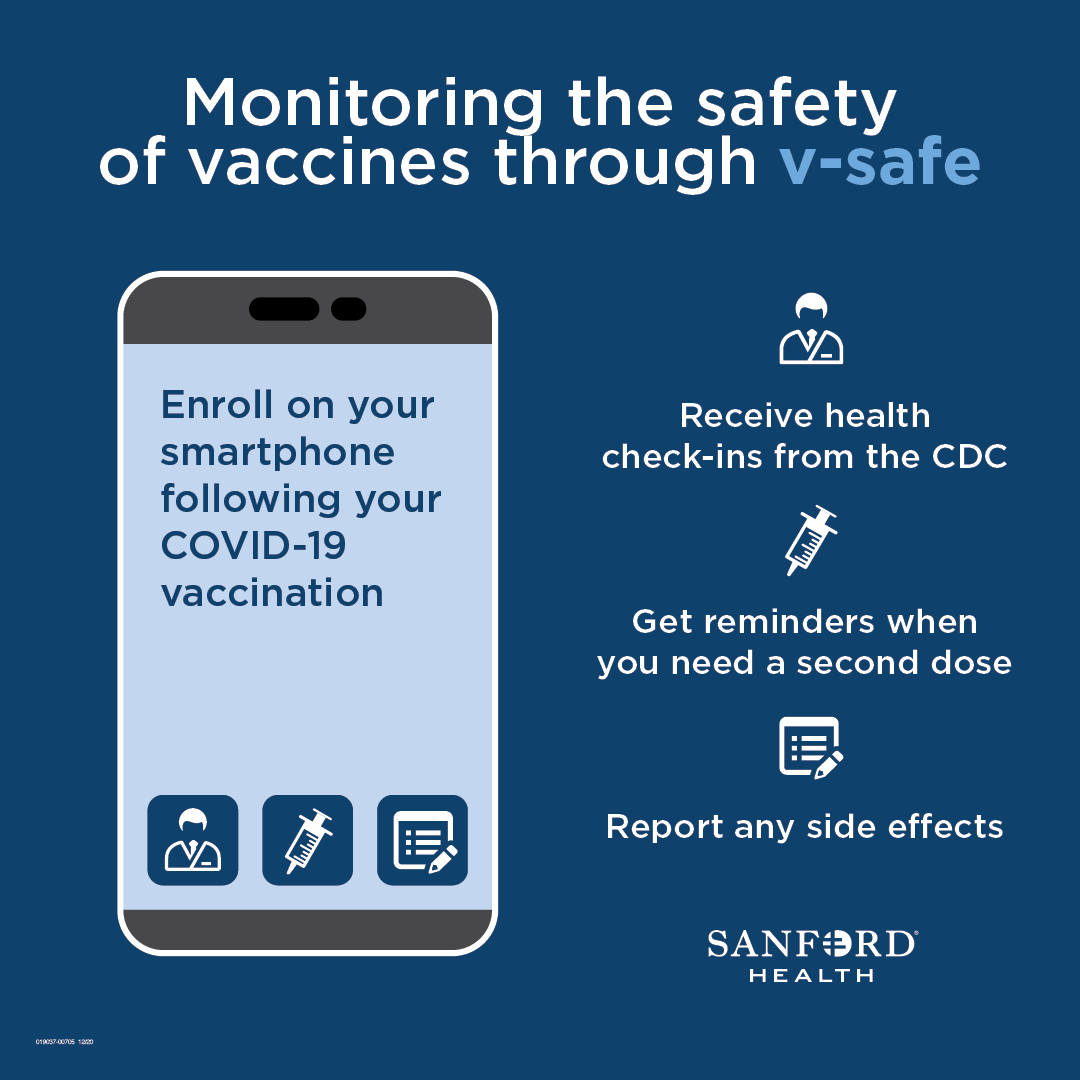Officials at Sanford Health and The Good Samaritan Society want to assure everyone that COVID-19 vaccination safety is an ongoing commitment.
To that end, the two organizations are encouraging participation in the V-safe program.
V-safe is a smartphone-based tool that uses text messaging and web surveys to provide health check-ins after receiving a vaccination. It enables those who have received the vaccine to quickly tell the CDC about any side effects.
Get vaccinated: COVID-19 vaccines at Sanford Health
The V-safe program will operate concurrently with traditional monitoring used for previous vaccines that are included in the Vaccine Adverse Event Reporting System (VAERS).
VAERS serves as the nation’s early warning system to detect possible issues with U.S. vaccines. It is co-managed by the Centers for Disease Control and Prevention (CDC) and the U.S. Food and Drug Administration (FDA).
In launching a convenient reporting system like V-safe for those who have been vaccinated, health officials are directly addressing and monitoring vaccine safety.
Enlarge

Infographic by Sanford Health
V-safe a convenient option
“Based on trial results I am expecting these vaccines to be both very safe and extremely effective,” said Pat Cote, Good Samaritan Society pharmacy services director. “V-safe will be able to provide a huge dataset to support that. It will also potentially help identify any areas of concern. My hope is that use of this V-safe platform will serve to increase consumer confidence. It will give each of us a reason to raise our hand to get vaccinated when it comes to our turn.”
This system will make it more convenient for those who have taken the vaccine and want to report accompanying side effects. V-safe will also be a more efficient way of getting patient data to health care officials.
“The benefit of the V-safe program is that it’s expanding the reach for more people to report adverse or strong reactions to the vaccine,” said Megan Maddox, Sanford Health enterprise medication safety officer. “You’ll get a daily text or email for the first seven days after you get your vaccine shot. And then you get one weekly for the next five weeks.”
Rigorous testing
Those who get the vaccine will get a V-safe information sheet with a link to registration. Once completed on a smartphone, V-safe will relay a health check-in text that links to a series of questions that involve one-touch responses on the screen.
The V-safe effort is a continuation of the vaccines’ rigorous testing over the last several months that led to FDA emergency use authorization. Those participating in the vaccine trials included those over 65 – a group that has been particularly vulnerable to the COVID-19 virus.
In the Pfizer trials, 45% were ages 56-85. In the Moderna study, 39% were 45-65 and 25% were 65 and over.
“The elderly were certainly included demographically,” said Dr. Greg Johnson, Good Samaritan Society chief medical officer. “In regard to the normal side effects that happen with people who take vaccines, they happen less frequently for those over the age of 55. That bodes well for our residents and clients.”
Vaccine and side effects
“It’s exciting that our staff can essentially become part of a huge expansion of knowledge about these vaccines,” Cote said. “Because we’re getting the earliest access, we can pay back that privilege by providing information that adds to everyone’s understanding of and confidence in these vaccines.”
Officials anticipate minor reactions to accompany vaccination for some. Similar to the two-dose vaccination for shingles, these side effects will most often be insignificant in comparison to dealing with the disease itself. Minor accompanying discomfort is most often a sign that the vaccine is doing what it is supposed to do.
“All vaccines have the potential for side effects,” said Andrea Polkinghorn, Sanford Health’s immunization strategy leader. “Some may have more than others. While unfortunate, it means their immune system is responding to the vaccine. That’s a good thing. It’s so important that even if people experience some side effects, they go ahead and get that second dose.”
Learn more
- COVID-19 FAQs: How do vaccines get developed and approved?
- Latest COVID-19 recommendations from Sanford Health providers
…
Posted In COVID-19, Immunizations, Research
